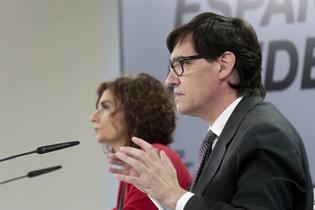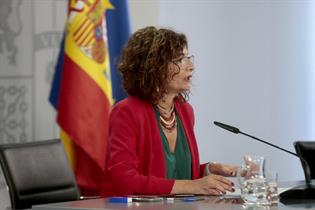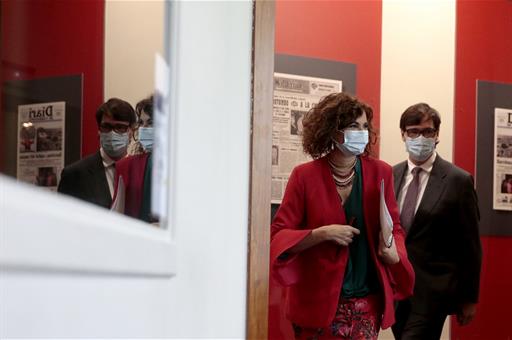Council of Ministers
Government authorises purchase of more than 31 million doses of vaccine against COVID-19
Council of Ministers - 2020.10.20
Moncloa Palace, Madrid
The Council of Ministers authorised the acquisition of 31,555,469 doses of the vaccine developed by AstraZeneca against COVID-19, of which, in principle, 3 million will be available as from December and the rest steadily from then until June 2021.
The Minister for Health, Salvador Illa, explained that this agreement evidences Spain's participation in the contract signed on 27 August between the European Commission and this company to acquire 300 million doses of vaccines for Member States.
The vaccine requires two doses to complete the immunisation, and hence the number of people that can be immunised is half the number of doses (15,777,734 million) and the total cost per immunisation is 5.80 euros. Of this amount, 2.24 euros will be charged to the European Commission and the rest, 3.56 euros, will be paid by each Member State. Spain calculates an initial disbursement of 56 million euros, which could rise to 76 million if the cost of the vaccine were to finally exceed initial forecasts, a possibility expressly contained in the contract, with a maximum increase of 20%.
Salvador Illa explained that the vaccine is presently in phase 3 of the clinical trials, being tested on 15 million people and under a process of open revision by the European Medicines Agency. "It is very important to stress that no vaccine will be supplied until it meets the safety and efficacy requirements", he stated.
Warning about second wave of COVID-19 in Spain and in Europe
 Foto: Pool Moncloa/JM CuadradoSalvador Illa claimed that the second wave of the coronavirus "is a reality throughout Europe", with a "very high" accumulated rate of cases per 100,000 inhabitants in a 14-day period. He also warned that we are expecting "some very tough weeks" as winter approaches.
Foto: Pool Moncloa/JM CuadradoSalvador Illa claimed that the second wave of the coronavirus "is a reality throughout Europe", with a "very high" accumulated rate of cases per 100,000 inhabitants in a 14-day period. He also warned that we are expecting "some very tough weeks" as winter approaches.
Salvador Illa reviewed the figures for France, with 400 accumulated cases per 100,000 inhabitants, Belgium with 723, the Netherlands with 486 and the United Kingdom with 310. In Spain, 310 is also the average figure, and although differences can be seen between regions, the general situation "is worrying" claimed the minister, who urged people "not to drop their guard and to stay alert".
The Minister for Health stressed that the essential measures for avoiding the spread of the virus are reducing mobility and contact between people, which should be in addition to the basic norms of frequent hand washing, the use of face coverings, social distancing of 2 metres, the constant ventilation of closed spaces and personal and collective hygiene.
Special coordination to halt the virus
The minister announced that he will hold a meeting on Wednesday, together with the Minister for Universities, Manuel Castells, with the regional health and university councillors of all the regional governments to evaluate the situation of the pandemic at university centres, surrounding areas and halls of residence. The following day, on Thursday, the ordinary meeting of the Inter-territorial Council of the National Health System will meet.
Salvador Illa positively rated the work undertaken by the regional governments and the "important and strict" measures that are being adopted to halt the spread of the virus. The minister reiterated that coordination with the regional authorities is functioning correctly and the government will continue to exercise the coordination tasks that correspond to its powers without invading the jurisdictional scope of any of these authorities. "The Government of Spain does not want to replace any public authority, but rather it falls to us to coordinate all the regional governments and everyone must be clear, now that winter is approaching, that we need to count on each other".
Along the same line, the Minister for the Treasury and Government Spokesperson, María Jesús Montero, claimed that these weeks are decisive for controlling the pandemic and conveyed a message of responsibility to ensure that stability and the general interest prevail in Spain. "It is important that we all uphold our responsibility on matters we are tasked with - the regional governments, Central Government, local authorities and all of our citizens".
Employment policies
 Foto: Pool Moncloa/JM CuadradoThe Council of Ministers approved the Annual Employment Policy Plan for 2020 (Spanish acronym: PAPE), which contains all the services and programmes that will be carried out by both the regional authorities and under the State Public Employment Service (Spanish acronym: SEPE).
Foto: Pool Moncloa/JM CuadradoThe Council of Ministers approved the Annual Employment Policy Plan for 2020 (Spanish acronym: PAPE), which contains all the services and programmes that will be carried out by both the regional authorities and under the State Public Employment Service (Spanish acronym: SEPE).
María Jesús Montero explained that the plan is structured around six pillars: guidance, training, job opportunities, equality in access to the job market, entrepreneurship and an improved institutional framework of the National Employment System.
The Plan has a total provision of 5.79 billion euros, of which 1.94 billion have already been distributed among the regional authorities.
The Government Spokesperson recalled that the Plan was redesigned at the Employment and Labour Affairs Sector Conference held on 1 April, at which it was agreed with the regional governments to distribute more than 1.05 billion euros. This is on top of the almost 896 million euros agreed at the Conference held on 30 September, which placed active employment policies at the heart of the reconstruction plans.
Joint response to the pandemic
María Jesús Montero reiterated that the government will maintain its roadmap, stepping up international efforts to enable a way out of the crisis stemming from the pandemic in a coordinated fashion. In this regard, she referred to the participation of the President of the Government, Pedro Sánchez, at the closing session of the Italy-Spain Forum for Dialogue, which seeks to respond to the crisis as efficiently as possible and speed up the green and digital transitions through strategic programmes.
Before this meeting, stated the Government Spokesperson, the President of the Government and the Italian Prime Minister, Giuseppe Conte, reviewed issues of general interest on the European agenda and discussed how to give a renewed boost to economic relations.
María Jesús Montero also confirmed that Pope Francis will receive the President of the Government on Saturday at the Vatican, where they will review the situation of the pandemic and the consequences it has caused, such as a rise in poverty and the situation of exclusion that some groups are suffering.
As regards the Conference of Regional Presidents scheduled for next Monday by video-conference, which will be attended by the President of the European Commission, the Government Spokesperson announced that the strategic lines of the recovery programme for all of the funds that comprise the European framework will be discussed.
Current affairs
When asked about the possibility of imposing a curfew in some regions, the Minister for Health responded that this question is being "studied and assessed", but that the decision has not yet been taken. In the event of imposing this, he said, it will have to come under the scope of a state of emergency and could have a temporary time limit of more than 14 days, and hence it would be necessary to see which groups would support the government in the Lower House of Parliament.
As regards the renewal of the General Council of the Judiciary, the Government Spokesperson insisted that this is a constitutional mandate and the government remains open to reaching an agreement, a pact, and to dialogue.
María Jesús Montero also declared that the Council of Ministers plans to approve the Draft National Budget to be presented to Parliament before the end of October to be debate before the end of the year. The Government Spokesperson stated that "there remain some minor issues to be resolved, but the agreement is almost finalised", although dialogue will bemaintained this week with all the political groups.
Non official translation





